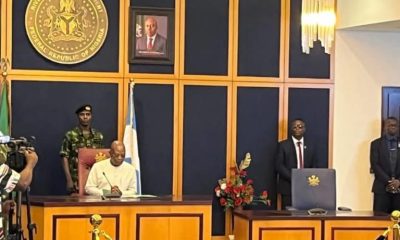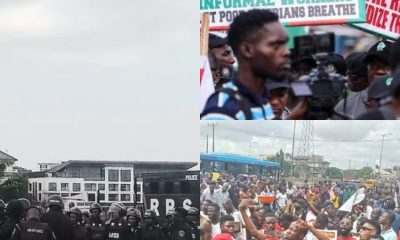Metro
Why Northern Nigeria Governors Not Serious About Eradicating Terrorists, Bandits

Retired General Ishola Williams, a former Commandant of the Army Signals, has spoken out against Nigeria’s security architecture, citing its ineffectiveness in addressing the growing issues of banditry and terror attacks.
He specifically criticised both military and political leaders for their lack of efficiency and willpower in tackling these challenges.
Williams emphasised that the situation has spiralled out of control, with bandits now operating freely and controlling large areas in the North. He argued that this is no longer just a matter of terrorism, but a more complex issue that requires a comprehensive approach.
Notably, Williams suggested that the military’s role should be focused on protecting the territorial integrity of the country, rather than pursuing bandits, which is the responsibility of the Mobile Police. He also advocated for the separation of National Paramilitary Force from the police service, recommending that it should be an independent entity.
Williams in an interview with Sunday PUNCH pointed out the claims of collusion between security agencies and bandits, as alleged by figures such as Islamic cleric Sheikh Ahmad Gumi and some northern governors.
“Do they have the will to face the bandits and defeat them? For me, if they don’t have the will, it simply means they are useless,” he remarked.
He emphasised that the military’s primary role is to protect the country’s territorial integrity, not to engage in internal counterterrorism operations. He proposed strengthening paramilitary police forces, such as the mobile police, to combat insurgency effectively.
The retired general criticised the reliance on the military to perform roles meant for specialised agencies and called for the restructuring of the Nigeria Police Force.
He said, “What is very important is that the military is doing the job of the mobile police. The mobile police was created separately from the regular police, with a different uniform and training, to carry guns like soldiers and fight bandits, kidnappers, and insurgents. That was why the mobile police was created.
“When the mobile police cannot do the job, the military is expected to support them, not to take over. But what we have seen is that the Nigerian police are confusing the job of policing with that of paramilitary policing, and that is a very big problem for the country.
“Therefore, you must separate paramilitary policing from ordinary policing. Policing should be at the state and local levels, not at the national level. This means you need to divide the Nigeria Police Force into a crime intelligence and criminal investigation agency.
“Also, there should be the National Paramilitary Force, which will now be the mobile police. They will be a separate agency and have a commander-general like the Customs and Immigration. Once they become a separate agency, they will have a clear focus. That means that the Inspector General of Police will be in charge of maintaining standards, training, monitoring, evaluation, and feedback on state policing. So, the existing Nigeria Police Force that you have now will disappear.”
Addressing the political dimensions of insecurity, Williams advocated for political solutions alongside military efforts. He made reference to the South-East crisis involving the Indigenous People of Biafra (IPOB), suggesting that releasing IPOB leader Nnamdi Kanu and engaging regional leaders could quell unrest.
“The killings and attacks will stop if a political solution is found,” he asserted, criticising the lack of proactive measures by both state and federal governments.
On the northern security crisis, Williams blamed governors for their inaction, particularly regarding the Almajiri system and the influence of traditional rulers. He cited instances of collaboration between traditional leaders and bandits, such as the turbaning of notorious bandit leader Bello Turji, as evidence of deeper systemic issues.
He said, “They (Governors) are not serious. If they cannot take care of Almajiri, can they take care of the terrorists? If you go to most parts of the North, you will see those children loitering about the whole place.
“The governors couldn’t take care of that. Don’t forget that there was a case of a governor who negotiated with a terrorist leader. Apart from that, Bello Turji was turbaned. Or didn’t you see the picture of him being turbaned with an emir?
“But how many emirs have been caught in the North by the governors for colluding with the terrorists? And how many of them have been taken to court? Yet people are being killed daily across the states. The governors are simply not serious.”
He recalled that Bello Turji (the notorious bandit kingpin) said “one important thing”.
Williams said, “He (Bello Turji) said, ‘The military knows where I am. Come and attack me.’ After that, he said, ‘Okay, since you don’t want to come, I am coming.’ So, where in the world can you see that? All the military could say is, ‘Oh, we will deal with him.’ But nothing has happened up until now. And the man is confident.
“In fact, let us go back to what Sheikh Gumi told everybody. He said the military intelligence and the security agencies know where the bandits are. Even the northern governors have said the security agencies are in collusion with the bandits. So, is anybody serious about bringing the security situation to an end? Are they serious?”
Williams dismissed claims that Boko Haram’s sophistication is too advanced for local forces to handle, arguing that the group’s operations are not insurmountable if intelligence agencies are properly equipped and functional.
He questioned the effectiveness of Nigeria’s intelligence services, calling for accountability regarding the sources of Boko Haram’s funding and supplies.
Reflecting on the broader implications, he called for a complete overhaul of Nigeria’s security architecture and urged the government to adopt a pragmatic, problem-solving approach to ensure the safety of its citizens.
Metro
Mob kills man over suspected dog theft in Bauchi

The Bauchi State Police Command has confirmed the death of a man identified simply as Peter, who was killed by a mob in Bauchi metropolis over allegations of dog theft.
This was disclosed in a statement released on Thursday by the Command’s Public Relations Officer, CSP Ahmed Wakili.
According to the statement, the incident occurred at about 11:30 p.m. on April 9, 2025, and involved a mob assault on two individuals accused of stealing a dog.
Wakili said the Commissioner of Police, CP Sani-Omolori Aliyu, has ordered a comprehensive investigation into what he described as an “egregious act of jungle justice.”
The second victim, identified as Dokagk Danladi, aged 38, was also attacked by a group of youths in a secluded area behind Lushi. He sustained severe machete wounds to the head and was rushed to the Abubakar Tafawa Balewa University Teaching Hospital (ATBUTH), Bauchi, where he is currently receiving medical treatment.
Peter, whose surname is yet to be identified, was found at the scene and was confirmed dead by medical personnel.
The Divisional Police Officer (DPO) in charge of the area has led a team of detectives to the crime scene to gather evidence and investigate the circumstances surrounding the incident.
CP Aliyu condemned the act, describing it as barbaric and a threat to the nation’s legal framework. He warned residents against taking the law into their own hands.
“No individual has the authority to brutalize a suspect. Anyone apprehended for any alleged crime should be handed over to law enforcement agencies for investigation and prosecution,” the Commissioner stated.
He appealed to the public to remain calm and cooperate with the police by providing relevant information that could aid the investigation.
“The Command is resolute in its pursuit of justice and is committed to ensuring that all those involved in this heinous act are brought to book,” Aliyu added.
Metro
Pastor sentenced to 15 years in jail for raping member under pretense of conducting deliverance

A 42-year-old Limpopo Pastor identified as Thabiso Victor Mongatane bagged 15-year jail term for r@ping a 25-year-old woman under the guise of offering her spiritual deliverance.
The Mahwelereng Regional Court, South Africa handed down the sentence for the 2022 r@pe that took place in Masodi village.
According to Limpopo Police Spokesperson Colonel Malesela Ledwaba, Mongatane exploited his position of trust and manipulated the woman into believing she was suffering from a condition that required spiritual intervention.
The incident dates back to March 2022 when the victim’s mother became ill and Mongatane was recommended by a relative to assist with her healing.
The victim brought her mother to Mongatane’s premises where he conducted what was described as spiritual treatment.
Several months later, on September 4, Mongatane prophesied over the young woman and instructed her to return two days later for further intervention related to so-called “obstacles” in her life.
On September 7, the woman complied and returned to Mongatane’s premises.
Ledwaba explained that Mongatane instructed the woman to undress and cover herself for steaming as part of the ritual.
After leaving her briefly, he returned and told her not to get dressed as he wished to continue the treatment. It was during this session that Mongatane raped her.
The victim later opened a r@pe case at her local police station. The case was taken over by the Mokopane Family Violence, Child Protection and Sexual Offences Unit, with Sergeant Lesetja Langa leading the investigation.
Mongatane was arrested on March 28, 2024, and initially released on R1,000 bail before being convicted and sentenced to 15 years of direct imprisonment.
Limpopo Police Commissioner Lieutenant General Thembi Hadebe praised the investigative team for their thorough work and welcomed the conviction, calling it a victory for justice and a message to others who exploit positions of trust.
Metro
Court orders final forfeiture of properties connected to ex-banker in Lagos

Justice Dehinde Dipeolu of the Federal High Court in Ikoyi, Lagos, on Thursday, ordered the final forfeiture of seven properties linked to Muiz Tijani Adeyinka, a former First Bank Plc employee.
The Economic and Financial Crimes Commission (EFCC) Head of Media and Publicity, Dele Oyewale, listed the properties. They include Plot 9, Block 28, Itunu City, Veritas Homes & Properties Ltd, Aiyetoro, Epe, Lagos State; a three-bedroom flat (Block A, Floor 6, Flat 2) at Le Moriah Residences Estate, Off Kusenla Road, Ikate Ancient City, Lekki Peninsula, Eti-Osa LGA, Lagos State; and a parcel of land (Block L1, Plot 13) at Amen Estate, Phase III Extension, Abomiti Zone, Lekki/Epe Express Way, Epe LGA, Lagos State.
Other properties are Block 3, Plot 13, Arizon Estate, within Idera Scheme Allocation via Eleko Junction, Ibeju-Lekki LGA; one plot within Arizone Estate, Idera Scheme, Ibeju-Lekki LGA; one plot within Itunu Residential, Aiyetoro, Ibeju-Lekki LGA; Plot 7, Block 4, Itunu City, Veritas Homes & Properties Ltd, Aiyetoro, Epe LGA; Plot 1, Ido Gwari 2 Extension, Ochacho Real Homes, LifeCamp, Abuja; and Block Q, Plot 25, Tiara by Amen City Limited, along Lekki/Epe Express Way, Yeguda Resettlement Scheme, Epe, Lagos State.
The order followed a motion filed by the EFCC’s Lagos Zonal Directorate 1, Awolowo Road, Ikoyi, through lawyer Zeenat Atiku. Justice Dipeolu had previously ordered an interim forfeiture and its publication in a national newspaper, giving interested parties 14 days to object.
Atiku presented the final forfeiture motion, noting no objections were received within the 14-day period. She supported the application with an affidavit from EFCC operative Isah Yusuf Nadabo. He stated that Adeyinka, a settlement office worker at First Bank, exploited his access to conduct “illegal, unauthorised and fraudulent activities” against the bank.
Nadabo added that investigations traced N35 billion benefitted by Adeyinka and his associates. Atiku argued that the properties were reasonably suspected to be proceeds of unlawful activities.
Justice Dipeolu found merit in the EFCC’s case and ordered the final forfeiture of the properties to the Federal Government of Nigeria.
-

 News7 hours ago
News7 hours agoInsecurity: Criminals Cart Away NSA Ribadu’s Office Hilux During Juma’at Prayer In Abuja
-

 News16 hours ago
News16 hours agoWe only had lunch with Buhari not 2027 politics -El-Rufai
-

 News16 hours ago
News16 hours agoSad! Explosion rocks Lagos
-

 News16 hours ago
News16 hours agoParts of Abuja, Niger in total darkness -AEDC confirms
-

 News15 hours ago
News15 hours agoIbas gives reasons why Sole Administrators were appointed for Rivers councils
-

 News10 hours ago
News10 hours agoOERAF Rounds Up Late Chief Ekuogbe Rowland Akpodiete’s remembrance with Novelty Match
-

 News14 hours ago
News14 hours agoUS embassy announces new requirements for visa interviews for Nigerian applicants
-

 News13 hours ago
News13 hours agoFive countries with easy work visas in 2025


















